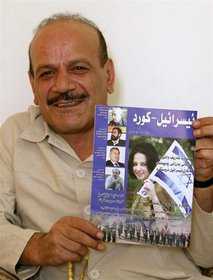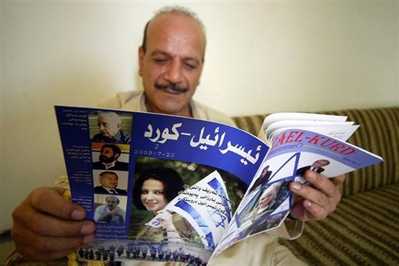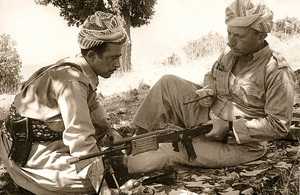Publication: Terrorism Monitor Volume: 7 Issue: 25
August 13, 2009 02:59 PM
By: Wladimir van Wilgenburg
Bozan Tekin, Vice President of the KCK
Reports indicate that Abdullah Ocalan, the imprisoned leader of the Kurdistan Workers Party (Parti Karkerani Kurdistan – PKK), will release a “roadmap” for resolving Turkey’s decades-old Kurdish insurgency on August 15 (see Terrorism Monitor, August 6). Branches of the PKK continue to operate in northern Iraq’s Kurdistan region both on the political and the military levels, despite Turkish military and diplomatic pressure. It seems that the political branch of the PKK is heavily restrained inside Iraq’s Kurdistan region, but military operations against the PKK are unlikely to resume in the near future.
The PKK Waits for Ocalan’s Roadmap
The Kurdistan Democratic Confederation (Koma Civaken Kurdistan – KCK), the umbrella organization bringing together Kurdish militant groups and political branches in Iran (Partiya Jiyana Azad a Kurdistane – PJAK), Iraq (Partiya Careseri u Demokrasiya Kurdistan – PCDK), Syria (Partiya Yekiti ya Demokratîk – PYD), and Turkey (PKK), is waiting for new orders from Abdullah Ocalan. The KCK’s Executive Council operates in the Haftanin, Metina, Zap, Gara, Avasin, Hakurk, and Qandil camps. The PKK also maintains a strong presence in the Mahkmur camp, which is controlled by the United Nations High Commissioner for Refugees (UNCHR).
According to PKK member Roj Welat, the PKK’s series of unilateral ceasefires is not a new strategy born out of weakness. [1] During this period the guerrillas have refrained from carrying out offensive operations. Welat says it is a strategy to solve the Kurdish issue peacefully, although the Turkish state believes the PKK’s five unilateral ceasefires are a sign of weakness.
KCK vice-president and PKK general Bozan Tekin says they will support the roadmap to the end; “In fact we don’t know what this roadmap is, but Ocalan said he is working on preparing it.” Tekin says it might look like the Basque or Scottish democratic model. [2]
Tekin said the PKK wants its own protection force, the release of the PKK leader and freedom of politics and identity. The PKK is ready to form a Kurdish PKK unit within the Turkish military if a solution is reached. But if Turkey doesn’t accept Ocalan’s roadmap, “we are ready to defend our country till our last drop of blood.” Although Ocalan says he will remain silent if the state doesn’t listen to his “last roadmap for peace,” PKK members emphasize that Ocalan will remain the leader of the PKK and that it’s not a dead-end for the PKK-leader if his proposals are not accepted.
The PCDK Has More Problems with Iraq than the Kurdish Regional Government
Besides the KCK leadership and military forces that operate in the near-inaccessible mountains, there is also a political branch of the PKK that operates in Iraq and the Kurdistan region. This organization is called the Kurdistan Democratic Solution Party (PCDK), which tried to participate in the Kurdistan regional elections of July 25 with its political slate “Hiwa” (Hope). The logo of the list was a combination of the flag of the PKK and the logo of the legal Kurdish opposition party in Turkey, the DTP (Demokratik Toplum Partisi – Democratic Society Party).
The PCDK was banned by Iraq’s Independent High Electoral Commission (IHEC) in June and is considered an illegal party in the Kurdistan Region. Najiba Omar, the female president of the Hiwa list, said they were informed by the IHEC that the list could not operate because the PCDK is not considered a legal party. [3] The Hiwa list believes that the KRG pressured IHEC to ban them.
The PCDK’s offices were also closed down in the provinces of Erbil and Sulaimaniya. According to Najiba Omar, “We cannot have offices in regions controlled by the KRG. We don’t have a problem with the Iraqi government, but with the Kurdish government.” While the PCDK is seeking support among Kurds, it cannot operate in KRG-administered regions; therefore the main headquarters of the PCDK is in Kirkuk.
The PCDK has other offices in Baghdad and Mosul while members operate from their own homes in the Kurdistan region. The PCDK also has party meetings and offices in villages near the border regions controlled by the PKK. Members of the party are not usually arrested, but after protests against the Hiwa list ban in June, some members were arrested for a short time.
The main aim of the PCDK is to change Kurdish society according to the principles of Abdullah Ocalan. The PCDK is suspicious of northern Iraq’s Kurdistan Democratic Party (KDP) and the Patriotic Union of Kurdistan (PUK), which have dominated the region since 1991. The PCDK is also wary of the new Kurdish “Change list,” a reform party that separated from the PUK and received a number of seats in the new parliament. The Change list will also participate in the Iraqi elections and Kurdistan local elections and could become stronger within the Kurdistan region. However, the PCDK suspects them of being supported by outside forces and thinks they won’t change the policies of the KRG.
The Kurdistan Regional Government’s PKK Policy
Minister Falah Mustafa Bakir, Head of the KRG’s Department of Foreign Relations, says that the KRG will make sure that their territories are not used as a launching pad by the PKK. “For us it’s important to have good relations with our neighbours. We don’t want our people to pay the price, we want a peaceful solution.” [4]
The KRG says it has taken the following measures:
• Cordoning off the mountain areas on the border with Turkey to cut PKK supply routes.
• Stopping foreign and Kurdish journalists from visiting PKK camps near the border regions.
• Closing down offices of the PKK’s political fronts in Erbil and Sulaymaniya.
• Monitoring airports to ensure that no PKK personnel enter or leave the region.
• Preventing PKK demonstrations in KRG territory and curtailing their activities.
• Banning PKK-affiliated political parties.
• Sharing intelligence with Turkey and the United States.
In February a tripartite U.S.-Turkish-KRG intelligence center was established in Erbil, Kurdistan’s political capital, to coordinate efforts and share intelligence in the fight against the PKK (Taraf, July 24). The KRG Foreign Minister says this does not mean that the KRG supports military action against the PKK but that the center only collects information on the PKK.
The Kurdistan government also supports the PKK’s ceasefire; Bakir says the government hopes the ceasefire “will help the peace process and [ensure] stability and we hope this will be maintained.” The KRG is against solving the PKK issue with military actions. “We don’t believe there is a military solution towards the PKK issue; there is no more need for violence or weapons.”
The PKK confirms that it is unlikely that the KRG will send forces to attack the PKK. “There is a red line among Kurds, that there won’t be another brother war [civil war] again. We don’t think this will happen. Kurds have learned from the past,” says KCK member Bozan Tekin. Tekin also denies claims that the PKK gets support from the KRG. “These are lies by Turkey to put pressure on the KRG.”
Independent Kurdish journalist Kamal Chomani says that the Kurdish government fears the PKK as a strong alternative and therefore tries to stop them from operating. [5] However, despite KRG measures, foreign and Kurdish journalists can still visit the PKK through “secret” roads and bypass KRG checkpoints.
The PKK also still manages to organize its own logistics, media campaigns, and support from surrounding villages, because the mountains are impossible to control without a massive deployment of Iraqi or Kurdish military forces. The PKK has checkpoints with PKK flags near the Qandil mountains.
Kamal Chomani says that even during the time of Saddam a complete mountain cordon was impossible. Chomani emphasizes that the triangular area with four borders was never controlled by any force. “This is a haven for rebel forces.”
Members of Peshmerga forces that fought against the PKK in the past confirmed that it would be very difficult to remove PKK forces from the mountains without many casualties. For the moment, the KRG seems more interested in controlling the regions it disputes with Baghdad than in the PKK camps in the border regions with Turkey and Iran.
The Central Government’s PKK Policy
Baghdad’s policy does not differ much from that of the KRG. Iraqi government spokesman Ali al-Dabbagh told a Kurdish newspaper that Iraq is not in favor of military operations against the PKK, nor does it want to close down the Makhmur refugee camp (Rudaw, August 6). “Iraq is against the PKK using its territory, but we don’t support Turkey in performing military operations against this party. We help the KRG to limit and decrease their presence inside Iraq and end their problem with Turkey.”
Although no PKK military forces are located in the territory controlled by the Iraqi central government, the political branch of the movement, the PCDK, has more freedom there than in the region controlled by the KRG. The PCDK headquarters was moved from Erbil to Kirkuk after the closure of PCDK offices in northern Iraq. PCDK official Najiba Omar says this is because, legally speaking, the Iraqi government cannot ban PCDK offices or activities in Iraq.
Assessing the PKK’s Future
The PKK indicates that they will renew their insurgency if the Turkish government does not listen to Abdullah Ocalan. The PKK wants the government to accept a Kurdish identity and release the PKK leader, which is unlikely.
The KRG has successfully curtailed PKK political activities in the Kurdistan region, but cannot eliminate the PKK’s border camps without starting military operations against the PKK, which does not serve their own interests. The KRG maintains the belief that the PKK is not a KRG problem, but an internal Turkish problem. It is unlikely, therefore, that the KRG will attack the PKK.
The Iraqi government might close down PCDK offices in its territory if pressured by the United States and Turkey, which would effectively leave the PCDK dysfunctional and cripple their level of support. The Kurdish and Iraqi governments will continue to share intelligence with Turkey, but will not support military operations against the PKK. The Iraqi army is not trained for counterinsurgency campaigns in the mountains nor does it have a sufficient amount of troops near PKK camps.
Therefore it is unlikely that the PKK will leave Qandil in the near future and will keep pressuring Turkey with attacks to solve the Kurdish issue. The PKK’s military forces and commanders will only leave the mountains if the PKK and Turkey reach a solution. Even the launch of Turkish military operations against the PKK inside Iraqi territory is unlikely to dislodge the PKK and will only result in more media attention for the PKK.
Notes
1. Author’s interview with PKK official Roj Welat in the Qandil mountains, August 5.
2. Author’s interview with PKK vice-president Bozan Tekin in the Qandil mountains, August 5.
3. Author’s interview with head of the Hiwa list, Najiba Omar, in Erbil province, Iraq, August 7.
4. Author’s interview with Falah Mustafa Bakir in Erbil, August 6.
5. Author’s correspondence with Kamal Chomani, a freelance journalist who writes for Livin magazine and the Kurdish newspaper Awena in northern Iraq, August 5.
https://jamestown.org/program/pkk-forces-await-orders-from-imprisoned-leader-abdullah-ocalan/









